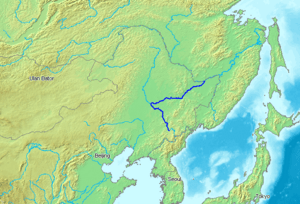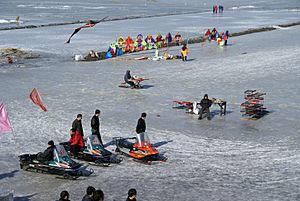Songhua River facts for kids
Quick facts for kids Songhua River |
|
|---|---|
| Country | People's Republic of China |
| Provinces | Jilin, Heilongjiang |
| Physical characteristics | |
| River mouth | Amur Tongjiang, Heilongjiang 47°41′56″N 132°31′03″E / 47.699°N 132.5176°E |
| Length | 1,897 km (1,179 mi) |
| Basin features | |
| Progression | Amur→ Sea of Okhotsk |
| Basin size | 557,180 km2 (215,130 sq mi) |
| Tributaries |
|
| Songhua River | |||||||
|---|---|---|---|---|---|---|---|

Songhua River is shown in a darkish blue color.
|
|||||||
| Chinese name | |||||||
| Chinese | 松花江 | ||||||
|
|||||||
| Alternative Chinese name | |||||||
| Chinese | 海西 | ||||||
|
|||||||
| Manchu name | |||||||
| Manchu script | ᠰᡠᠩᡤᠠᡵᡳ ᡠᠯᠠ | ||||||
| Romanization | sunggari ula | ||||||
The Songhua River is a very important river in China. It is the longest river that flows into the Amur River. The Songhua River travels about 1,897 km (1,179 mi). It starts in the Changbai Mountains, near the border of China and North Korea. Then it flows through two Chinese provinces: Jilin and Heilongjiang.
The river collects water from a huge area, about 557,180 km2 (215,130 sq mi). Each year, a large amount of water flows out of the river. This amount is between 76.2 km3/a (2,410 m3/s) and 81.77 km3/a (2,591 m3/s). The land around the river is very flat. This flatness has caused the river to change its path over time. Because of this, you can see many oxbow lakes along the river. These lakes are old parts of the river's path.
Contents
Where the Songhua River Flows
The Songhua River begins south of Heaven Lake. This lake is close to the border between China and North Korea.
River's Path and Dams
From its start, the river flows north. Along its way, it passes several large hydroelectric dams. These include the Baishan, Hongshi, and Fengman dams. The Fengman Dam creates a long lake that stretches for 62 kilometers (39 mi). After this dam, the river is sometimes called the Second Songhua. It flows north through the city of Jilin. Then it turns northwest.
Joining Other Rivers
The Songhua River is joined by its biggest tributary, the Nen River. This happens near the city of Da'an. After this, the two rivers combine to form the main Songhua River. The Songhua then turns east and flows through the big city of Harbin. After Harbin, two more rivers join it. The Ashi River flows in from the south, and the Hulan River joins from the north.
New Reservoir and Final Destination
In 2007, a new dam was built near Bayan. This created the Dadingshan Reservoir. The reservoir is named after a beautiful area on its south bank. The river continues flowing through Jiamusi. It passes south of the Lesser Xing'an mountain range. Finally, the Songhua River joins the Amur River at Tongjiang, Heilongjiang.
The Songhua River freezes over every year. This happens from late November until March. The river's water level is highest in spring. This is when the snow in the mountains melts. Medium-sized ships can travel on the river up to Harbin. Smaller boats can go even further, up to Jilin City. They can also travel on the Nen River up to Qiqihar.
Major Cities Along the River
Many important cities are located along the Songhua River:
- Jilin
- Harbin
- Jiamusi
Important Events in Songhua River History
The Songhua River has faced some challenges over the years.
2005 Chemical Spill
In November 2005, the river was affected by a chemical spill. This happened after explosions at a chemical plant in Jilin City. The spill caused the water supply in Harbin to be shut down. The polluted area stretched for 80 kilometers (50 mi). The chemicals eventually reached the Amur River, which is on the border between China and Russia.
2010 Floods and Barrels
On July 28, 2010, floods caused problems for the river. Several thousand barrels from two chemical plants in Jilin City were washed away. Some of these barrels contained chemicals that could explode.
2016 Minor Flood
In 2016, the part of the river near Jilin City had a small flood.
See also
 In Spanish: Río Songhua para niños
In Spanish: Río Songhua para niños
- Geography of China
- Mudanjiang River
- "Along the Songhua River", a Chinese patriotic song
 | Sharif Bey |
 | Hale Woodruff |
 | Richmond Barthé |
 | Purvis Young |


